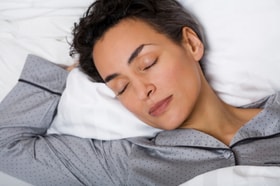
Are you a night owl or an early bird? Do you burn the midnight oil or are you early to bed, early to rise?
It is customary now to divide people into morning and evening people.
The morning type has peak performance in the morning. They are perky, get up easily and get started with work with a clear head. This is as it is supposed to be in nature.
Then there is the evening type, who is at peak performance in the afternoon or evening. They have difficulty waking up and can’t function without their coffee. It takes them more effort to concentrate on a morning task and they often don?t seem cheerful until later in the day.
The morning type is not a problem at all, but evening people usually complain of fatigue, poor sleep and other problems. How does it happen that some people function normally in the morning and others can’t?
We all have an internal clock that determines our activity. It is set by dawn and sunrise and cannot be changed. It determines the quality of sleep (1,2). Therefore if we have restorative normal sleep, we get up bright end early. But what if we do not have normal sleep? For example we go to bed late, trying to cheat our internal clock? Then we are in trouble: no energy in the morning because there was no proper rest at night. If there’s not enough rest then you are stressed out, leading to your cortisol level changes and hence sleep changes. This may lead to adrenal gland exhaustion and adrenal fatigue. And this makes the problem even worse. And it is real: research showed the cortisol and morning/evening type connection (3).
What can we do to improve our sleep and get more energy and improve our performance?
1. Go to bed early with sun down, get up early with sunrise. Do not try to cheat your internal clock — you will lose. Remember: ? Early to bed, early to rise makes people healthy, wealthy and wise.”
2. Minimize your stress to normalize your cortisol and adrenalin levels.
3. Check yourself for toxic metal burden. Insomnia is a very well known symptom of mercury and lead toxicity.
4. Stay away from carbs except fresh organic fruits and vegetables: carbs especially simple carbs like cookies can cause low sugar levels at night that may wake you up.
5. Eliminate noise and any light in your bedroom.
6. Stay away from processed foods and food additives like MSG, which is known as an excitatory neurotransmitter.
7. Eat plenty of organic fruits and vegetables. Dates, bananas and papaya in the evening are beneficial.
8. Have more sex to relax.
9. Check your hormone levels to rule out hormonal imbalance as a cause of insomnia.
References:
1. 1. Wyatt, James K.; Ritz-De Cecco, Angela; Czeisler, Charles A.; Dijk, Derk-Jan (1 October 1999). “Circadian temperature and melatonin rhythms, sleep, and neurobehavioral function in humans living on a 20-h day”. Am J Physiol 277 (4): R1152?R1163. Fulltext. PMID 10516257. Retrieved 2007-11-25.
2. http://en.wikipedia.org/wiki/Sleep
3. Zavada, Andrei; Gordijn, Beersma; Daan, Roenneberg (2005). “Comparison of the Munich Chronotype Questionnaire with the Horne-?stberg’s Morningness-Eveningness Score” (PDF). Chronobiol. Int. 22 (2): 267?78. doi:10.1081/CBI-200053536. PMID 16021843. Retrieved 2007-11-02.

